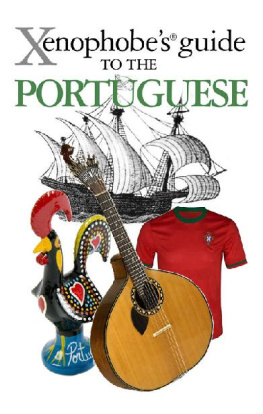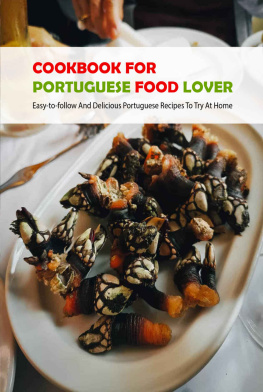Matthew Hancock - The Xenophobes Guide to the Portuguese
Here you can read online Matthew Hancock - The Xenophobes Guide to the Portuguese full text of the book (entire story) in english for free. Download pdf and epub, get meaning, cover and reviews about this ebook. City: New York, year: 2012, publisher: Oval Guides, genre: Detective and thriller. Description of the work, (preface) as well as reviews are available. Best literature library LitArk.com created for fans of good reading and offers a wide selection of genres:
Romance novel
Science fiction
Adventure
Detective
Science
History
Home and family
Prose
Art
Politics
Computer
Non-fiction
Religion
Business
Children
Humor
Choose a favorite category and find really read worthwhile books. Enjoy immersion in the world of imagination, feel the emotions of the characters or learn something new for yourself, make an fascinating discovery.
- Book:The Xenophobes Guide to the Portuguese
- Author:
- Publisher:Oval Guides
- Genre:
- Year:2012
- City:New York
- Rating:3 / 5
- Favourites:Add to favourites
- Your mark:
- 60
- 1
- 2
- 3
- 4
- 5
The Xenophobes Guide to the Portuguese: summary, description and annotation
We offer to read an annotation, description, summary or preface (depends on what the author of the book "The Xenophobes Guide to the Portuguese" wrote himself). If you haven't found the necessary information about the book — write in the comments, we will try to find it.
Abstract: A guide to understanding the Portuguese which dispels or confirms preconceived prejudices with humor and insight
The Xenophobes Guide to the Portuguese — read online for free the complete book (whole text) full work
Below is the text of the book, divided by pages. System saving the place of the last page read, allows you to conveniently read the book "The Xenophobes Guide to the Portuguese" online for free, without having to search again every time where you left off. Put a bookmark, and you can go to the page where you finished reading at any time.
Font size:
Interval:
Bookmark:

Published by Xenophobes Guides
London SW9 7QH
Telephone: +44 (0)20 7733 8585
E-mail:
Copyright Xenophobes Guides Ltd.
All rights reserved, including the right of
reproduction in whole or in part in any form.
First printed 2012
Revised 2013
Editor Catriona Tulloch Scott
Series Editor Anne Taut
Cover designer Vicki Towers
Printer Polestar Wheatons, Devon
Xenophobes is a Registered Trademark.
Grateful thanks are given to Luke Tilley
for his help and suggestions.
ePub ISBN: 9781908120755
Mobi ISBN: 9781908120762
Print ISBN: 9781903096840
Contents

The population of Portugal is 10.5 million, compared with 47 million Spanish, 62 million British, 64 million French, 206 million Brazilians and 315 million Americans.
The bulk of Portuguese-speakers are elsewhere in the world, in the former Portuguese colonies of Angola, Brazil, Cape Verde, Goa, Guinea Bissau, Macau, Mozambique, East Timor, and the islands of So Tom and Prncipe.
Portugal is more than twice the size of Switzerland but is one-fifth the size of Spain, and could fit into Brazil 90 times.
Nationalism & Identity
Historically the Portuguese have turned their backs on the rest of Europe and instead looked in on themselves: a tight-knit family group where formality and old-fashioned politeness remain highly prized values and where a sense of togetherness has enabled them to retain their independence. Portugals border with Spain is one of the least changed borders in the whole of Europe: it is virtually the same as when its boundaries were defined by treaty in 1297.
To be Portuguese means to be reserved: that gesticulating exuberance is left to their Mediterranean cousins.
Sitting on the periphery of Europe suits the Portuguese. They may be in the same school class as the southern Europeans, but they are the shy kids who sit at the back hoping not to be noticed. To be Portuguese means to be reserved: that gesticulating exuberance is left to their Mediterranean cousins. Perhaps this is because the Portuguese are never influenced by the balmy heat of the Med: their temperament is forever cooled by the Atlantic whose surf pounds their countrys western and southern shores. And its eastern and northern borders are edged in by Spain, historically their rivals in love and war. Closed in on all sides, they tend to keep their heads down.
How they see themselves
The Portuguese see themselves as a giant family. A homogeneous race with no splinter groups agitating for independence or complaining about the repression of an obscure language, they will stick together on all occasions.
A homogeneous race, they will stick together on all occasions.
They also see themselves as a nation of great explorers, happy to seek out pastures new when things are really tough. Portuguese communities flourish in places as diverse as Venezuela, South Africa, Luxembourg and Canada.
Fiercely loyal to each other and to their countrys ways, the Portuguese consider themselves to be tolerant and open-minded. Portugal was, and still is, one of the most ethnically diverse countries in southern Europe. When the dictatorship which had governed the country for several decades ended in 1974, over half a million people from newly independent former colonies mostly from Angola and Mozambique knocked on Portugals door and they were all let in. To the Portuguese, these people were not so much foreigners as overseas relatives.
When Britain handed Hong Kong back to the Chinese, it pretty much waved goodbye to the Hong Kong residents. When Portugal did the same with the neighbouring colony of Macao in 1999, it allowed any of its residents to become a Portuguese citizen. The same has applied to Goa in India and East Timor in Indonesia: anyone who lived there before they became independent could claim Portuguese citizenship.
The peoples of its former colonies may be distant cousins with different names, but to the Portuguese, they are still part of the extended family. And they dont just receive a Christmas card once a year: they are welcome to stay at any time, for as long as they like.
How others see them
As Portugal shares the Iberian peninsula with Spain, the rest of the world generally assumes that the Portuguese are a Mediterranean race. The impression is of a land of seafaring fishermen who make good waiters and occasionally throw up good footballers; a place where people are called Jos, play the guitar, eat paella and grilled sardines, and once had a famous navigator called Henry.
The impression is of a land of seafaring fishermen who make good waiters and occasionally throw up good footballers.
The reality is that the Portuguese are an Atlantic race, fiercely independent from Spain. There are a lot of Joss but dont call them Hosay like the Spanish: in Portugal they are Jo-say. They do listen to guitar, but to the Portuguese guitar played with fado, not flamenco. And their rice and seafood dish is arroz de marisco, not paella. So Portugal may be like Spain, but it is certainly not a Spanish satellite.
The un-Mediterranean character of the Portuguese can come as a surprise. They are relatively quiet and easy going, an erstwhile colonial power which has absorbed a substantial number of immigrants from its former colonies with apparent ease. But though not a Mediterranean race it is still a southern European one, with the quaintness, the inefficiencies and slow-paced living that one comes to expect from a land with a sunny climate whose people are rarely hurried.
The special relationship
Portugals special relationship with Brazil is very much like the one between the UK and the USA: a former colony that outgrew its coloniser and whose culture permeates every aspect of its founder nation. The evening schedules of a whole family can revolve around the times of the nightly Brazilian telenovelas (soap operas). These show the dramatic exploits of glamorous leggy women and macho hunks in exotic locations, with the inevitable fofoca (scandal and intrigue), a potent mix that is so popular that to be cool you have to use a few Brazilian Portuguese expressions like tudo bem? (hows it going?) and ciaozinho (see you).
The evening schedules of a whole family can revolve around the times of the nightly Brazilian telenovelas (soap operas).
The Portuguese also find they dance better to Brazilian rhythms (all the rage in many clubs) after a few caipirinhas, a highly alcoholic Brazilian cocktail made with distilled sugar cane.
The Portuguese are rather proud of the New World glamour Brazilians bring to Olde Worlde Portugal.
Until Portugal joined the EU, Brazilians could freely enter Portugal, and even today there is a healthy population of brasileiros, mostly the educated elite who use Portugal as a stepping stone into Europe. The Portuguese are rather proud of the New World glamour Brazilians bring to Olde Worlde Portugal, though not all are happy with their cultural mores.
In addition, the Brazilians are inclined to regard the Portuguese as quaint, old-fashioned and slightly dim. And here lies the rub, or rather the Portuguese Achilles heel: a sensitivity about the attitude of people from their former colonies, especially Brazil. The brasileiros in Portugal are not only over-paid, over-sexed and over here, but are often furnished with an overweening sense of superiority. The Portuguese take pleasure in reminding their Brazilian cousins that most of their place names, their state religion and their language all came from Portugal. Anyone who claims to have shaved clean their Portuguese roots would be a bare-faced Brazilian indeed.
Next pageFont size:
Interval:
Bookmark:
Similar books «The Xenophobes Guide to the Portuguese»
Look at similar books to The Xenophobes Guide to the Portuguese. We have selected literature similar in name and meaning in the hope of providing readers with more options to find new, interesting, not yet read works.
Discussion, reviews of the book The Xenophobes Guide to the Portuguese and just readers' own opinions. Leave your comments, write what you think about the work, its meaning or the main characters. Specify what exactly you liked and what you didn't like, and why you think so.













